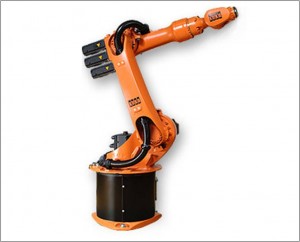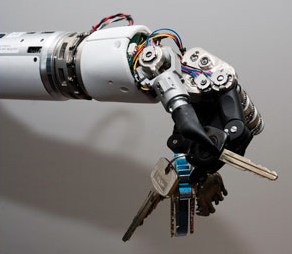or Mechatronic Engineering, humourously (but incorrectly) referred to as Megatronics at times. In Afrikaans Megatronika or Megatroniese Ingenieurswese. What is it? What can you do with it? When I started studying I didn’t know, after 5 years I think I have a vague idea. So below I’m going to post what I know.
In it’s simplest form it’s a combination of Mechanical and Electronic Engineering. If I really don’t feel like explaining, I simplify it to robotics. This is certainly a large portion of Mechatronics, but by no means a limiting factor.
Mechatronics as a named profession is fairly new, but the idea has always been there. In the South African context, UCT have had an accredited BSc (Eng) Mechatronics course since 1997 (although how long it has actually been running is uncertain), NMMU a BEng since 2007 (first graduates) and Stellenbosch since 2005 [1]. Potchefstroom University (NWU) are apparently aiming to start a course in the next few years [2]. Although not offered in the BEng format, UKZN do offer Masters through their Mechatronics and Robotic Research Group [3]. [EDIT: added list of BTech degrees and Diplomas offered at the bottom of the post]
Mechatronics at Stellenbosch [2]
I completed my BEng Mechatronics at Stellenbosch University in 2011. The Mechatronics course was presented by the Department of Mechanical and Mechatronic Engineering in a four year course. The first two years were identical to that of those studying towards a BEng Mechanical. The first year course is identical for all engineering students. In the third and fourth years, the two courses still followed similar routes, with the Mechatronics course replacing several Mechanical courses with some courses presented by the Department of Electronic and Electrical Engineering. In third year these included Electronics and Computer System’s courses and fourth year Electronics and Electronic Design Courses. Losing out on some Strength of Materials and Thermo-Fluid Mechanics.
The department put it this way [6]
The most important difference between the mechanical engineering programme and the mechatronic programme is that mechanical engineers are equipped to develop mechatronic systems with existing controllers (computers, PLC’s, etc.), while mechatronic engineers are also equipped to develop specialised controllers (e.g. for embedded controllers) and the relevant electronics themselves.
At the time, the Head of Department felt that Mechatronics as an entity was still too new. Employers weren’t advertising for Mechatronic Engineers, and didn’t really know what to do with them when they did get them. This resulted in the close ties between the Mechanical and Mechatronic courses. I was often unhappy about this, having would of preferred more focus on the Electronics, but in the end it worked out. And the HoD’s opinions were/are valid.
When I chose Mechatronics, I didn’t know where I was going to work, I chose the course because it sounded interesting. It wasn’t until my final year that I found a direction to work towards. Course setups at different universities are going to be different, and will put emphasis on different subjects, that doesn’t necessarily make one better than the other. Either way you’re going to come out of it with a degree and a fair amount of knowledge. Most importantly though (and this is true for any engineering degree) is you’ll know how to learn.
I’m quite confident that specific things that I learn in my first year of work will be of more value to my career than a specific subject at varsity, but having struggled through several subjects, I know I can figure out most things that come my way. I know where to look and how to go about solving problems.
In my final year we were a class of 85 Mechanical/Mechatronic students, of which I’d say about 30-35 received their BEng Mechatronics in 2011.
Mechatronics at NMMU [2]
NMMU have a slightly different setup. Mechatronics is presented by the Mechatronics school of the Department of Engineering, the Built Environment and IT. Mechatronics is the only Engineering degree they offer. As such, first year physics and maths are taken alongside BSc students and after the first year, courses taken are aimed only at Mechatronics students. The format of the course is still identical to that of when it started giving a good balance of subjects. The University also offers an array of BTech degrees in other Engineering fields.
I’m currently pursuing my master’s degree at NMMU. Their 4th year BEng Mechatronics class has roughly 25 students in it and the 3rd year class about 30. First year applications are limited to 60, with the most recent 1st year class starting with 50 students. The Mechatronics department is currently sponsored by General Motors South Africa (who have a plant in PE) and also have close ties to the Volkswagen plant in Uitenhage.
Mechatronics in General
Mechatronics as a career is still finding its feet. Meaning many consider it a jack of all trades, master of none type of situation, and although the course may feel that way, it’s certainly not the end of the story.
Mechatronics isn’t a new field, it’s just finally been given a name. When you tell people you’re a Mechatronic Engineer they don’t know what that is. I had a month stint at a large production facility as part of vacation training and I was asked to choose between focusing on their Mechanical or Electrical divisions, eventually settling for a bit of time at each. But that’s how businesses in SA are structured. This will change.
Several Mechatronic Engineers that I know have taken up Automation maintenance posts. Nothing wrong with this, personally it’s not where I want to be. Contrary to this though, my first job next year will be in automation maintenance. I however plan to use this as a stepping stone into a design career.
Automation is fun, and whereas I am going into automation in a production sense, automation also relates to smaller and/or more technical situations. The recent landing of the Curiosity rover on Mars is a perfect example of Mechatronic systems. There are several elements here, from the automated landing system to the remote control of the device.
In the motor industry, systems such as traction control, ABS and ESP are all examples of Mechatronic systems. Heavily complicated systems that rely on the processing of data from sensors to enable control of actuators. As such a Mechatronic Engineer can make him/herself home in many different industries. These include the Automotive, Aerospace, Manufacturing, Medical and Communications Industries.
Mechatronic Engineers can register with ECSA to become Professional Engineers [4]. The industry is governed by the South African Institute for Mechanical Engineers. I don’t see Mechatronics separating from this tree any time soon. The degree, being accredited by ECSA also means that the degree will be recognised internationally in many countries thanks to the Washington, Sydney and Dublin Accords [5]
So what do you do when you have your degree? You do whatever you want. You’ll find something. I’m not aware of any of my colleagues who are currently not pursuing a post-graduate degree or are employed. Not all of them are in Mechatronic specific posts. Some have opted for more mechanical orientated jobs, while others have gone entirely into areas such as electronic design or programming. And that’s one thing, a degree in Mechatronic Engineering in no way limits you. Very few engineering degrees will actually.
After re-reading what I’ve written, I think I’ve put forward some information relating to Mechatronic Engineering, but it’s still left fairly vague, maybe it’s just because none of us know what we’re really doing :)
A National Diploma in Mechatronics (for registration as a Professional Engineering Technician) can also be had from the following institutions [7]:
- Tshwane University of Technology
- UNISA
- Cape Peninsula University of Technology
A BTech in Mechatronics (for registration as a Professional Engineering Technologist) from [8]:
- Tshwane University of Technology
- UNISA
- Cape Peninsula University of Technology
and to reiterate, a BEng, or BScEng (for registration as a Professional Engineer) [1]:
- Stellenbosch University
- University of Cape Town
- Nelson Mandela Metropolitan University
Note: Although other institutions may offer courses in Mechatronics, or Mechanical Engineering with a focus on Mechatronic elements, the ones listed above are the only ones recognised by ECSA for registration as a mechatronic professional. Information was correct at time of posting, but may have changed since.
There are also several Universities of Technology and FET Colleges which offer courses in Mechatronics. CPUT is one of these institutions. Another training institution is Umbilo Training Specialists in Durban. They are running a free training course, once a month where anyone can come to learn more and expand their knowledge. Checkout their page for details.
For some more reading and a very complimentary view with some poignant remarks have a read here.
As part of my degree at Stellenbosch University I completed a project which can be seen here.
As part of my master’s degree at NMMU I completed a project which can be seen here and here.
If you’re looking for bursaries, try this website.
If you have any questions, feel free to ask in the comments section.
- [1] ECSA – Accredited Universities
- [2] Much of what is stated comes from my own experiences and conversations with relevant people.
- [3] UKZN – Mechatronics and Robotics
- [4] ECSA – Registration
- [5] ECSA – Recognised Qualifications
- [6] Stellenbosch University – Mechatronic Engineering
- [7] ECSA – Accredited Diplomas
- [8] ECSA – Accredited BTech





Hello Gareth
Thank you.This was very helpful.
I recently finished S4 at MUT in mechatronics, I was wondering if you know of any companies I can contact for my inservice training.
Another thing, do you know what modules I need to be able to continue with my btech at TUT
Hi Vanessa, sorry I don’t know the area very well. It’s usually easiest to get in with large manufacturing companies, as they are setup for taking on interns. Places like Toyota etc.
Hi Gareth
I consider to study mechatronics next year at fet college, can i have opportunity like the ones study at university?
Hey Edward, anyone can apply to study mechatronics at university. You just need to ensure you have the marks to meet requirements
Hi , I’m currently in High School(Grade 12). I’m looking forward to a future that includes Mechatronics. I got in for Electronics and Electrical Eng over at Stellenbosch and for Mechatronics Eng at NMU. Since Stellenbosch has a common year Eng program one could transfer after first year to their MECHATRONICS. What would you recommend I choose? What would you do ?
Hey Emmanuel,
I cam’t make that decision for you. I had kind of decided I wanted to go to Stellenbosch before I had decided what I wanted to study. I lived nearby, my family had all gone their, lots of my friends were going there etc. From a course perspective they are both good degrees, and from a purely educational perspective, the bigger factor will be how hard you work, rather than which one you study at. Try read up a bit about what else each department offers besides the course itself, things like robotic’s challenges, industry partnerships etc and how those might affect your time there. Also take into account what the degree will cost you, where you would stay and such things.
All the best!
hi Gareth, i want to study mechatronics at any a TVET college in polokwane called Capricorn i have not done pure mathematics in high school but iv worked in the electronics field as a machine operator for seven years will that count somehow prior my studies i have a computer certificate but not enuf for programming,please help me out.
Hi Gordonk,
based on their website, as long as you have completed grade 12, you should be able to enroll in the course. I don’t see specific requirements for pure maths. Pure maths will of course be helpful, the curriculum includes a Mathematics course, but I’m not sure at what level. If you do the course you will likely have to work quite hard on the Mathematics section.
Try contacting the College directly though for confirmation of this.
Good luck!
Did you apply ??? If they accepted you please follow me on Instagram thikho_1602
Hi Gareth,
Thanks for the clarity!
Can someone who completed a degree in Mechatronics at NMU work in the mining industries ?
And does Mechatronic engineer solve all mechanical problems like transport industry, manufacturing machines, installation of car engine, or it only work with .automations and robotics.
Basically I wanna know if can Mechatronic engineer fully replace Mechanical Engineering at any industry?
Hey Kwanda
It depends on a lot of factors. When you study something, you learn a lot of the basics. But the real learning starts when you start working in a specific industry.
A mechanical engineer who’s been working in the HVAC industry for several years cannot just replace another mechanical engineer who’s been doing transport industry related work. And vise-versa.
Likewise, when you study mechatronic engineering, you are learning the basics of a lot of things. That doesn’t mean you can do everything in that industry or any other industry.
With a mechatronic engineering qualificaiton, you can probably apply for any mechanical engineering job.
But remember that when applying for jobs, if it’s not an entry level job, experience is going to count more than what your specific educational qualifications are.
Hi Gareth, is there any place where I can get a higher certificate in mechatroics beside nmmu?
Hi Sanele,
Unfortunately I wasn’t able to find any other Higher Certificate courses, you can find a list of all Mechatronics courses by searching ‘mechatronics’ on the SAQA website: https://allqs.saqa.org.za/search.php
Hi Gareth
Nice information
Can you please help me in the difference between BSC in engineering in Electro Mechanical And BSC in engineering in Mechatronics.
And
Can BEng Mechatronics graduate from NMU or any other university be able to work in Mechanical engineering industries like Power generators, aircraft engine installations, as a mechanical engineer not in the robots side.
Courses vary with time and between institutions, you should look at specific courses for details.
The main difference between electro-mechanical and mechatronics, is that mechatronics includes computer system related courses, so you’ll most likely do some microcontroller work, learn more about sensors and actuators and potentially an extra programming course. Electro-mechanical will be more focused on high voltage motor designs and related technologies.
Engineering courses in general are fairly inter-disciplinary. While you learn a lot of basics in your undergrad, you really only specialise in any meaningful way when you have a job. As such a mechatronics course is not going to significantly limit the type of work you can do, unless you’re intending to focus on something like CFD modelling or other heavily mechanical subjects, which a mechatronics course doesn’t touch on at all.
Dear Gareth
Does BEng Mechatronics graduates from nmu or Stellenbosch uni work with software , electronics and robots only in the industry. Or they can dust themselves by working with bare hands as pure electrical engineers in those big electrical industries n as pure mechanical engineer at some point,
Actually I’m keen on knowing if does Mechatronics engineer from above mentioned university have pure dept in mechanical and electrical engineering?
By the way how is industry feels like🤔
As I responded to your previous comment, engineers are fairly interdisciplinary early in their career. Meaning, they can enter different fields and become proficient.
I don’t fully understand your second question. If you’re wanting to get a Bachelor’s of Engineering degree, from NMMU you can only get a mechatronics degree. They do offer diplomas in other fields. Stellenbosch offers degrees in Mechanical and Electrical engineering as well.
Industry is very different to studying. Many people find it more enjoyable, as you’re directly applying skills you’ve learnt. Your experience will vary greatly depending on where you end up working, and the type of work you do.
😒I don’t have physical science grade 12,👉 but have Engineering and Related Design L4 & currently busy with N3 Electrical Engineering,🤔 will I be able to do Mechatronics Engineering with these
Hi Eldeahno,
I read over this article which explains a bit opportunites with an N3. If you complete your N3, it should make you eligible to study towards a diploma in Mechatronics. If you’re very interested in studying further, I would contact TUT, or CPUT to check their admission requirements.
hello Gareth, my son just told me tonight that he is interested in mechatronics engineering, and i”ve been searching and trying to understand it.. he is 15. please could you share your experience with him? thank you
Hi imaobong, If you have specific questions I’m happy to answer.